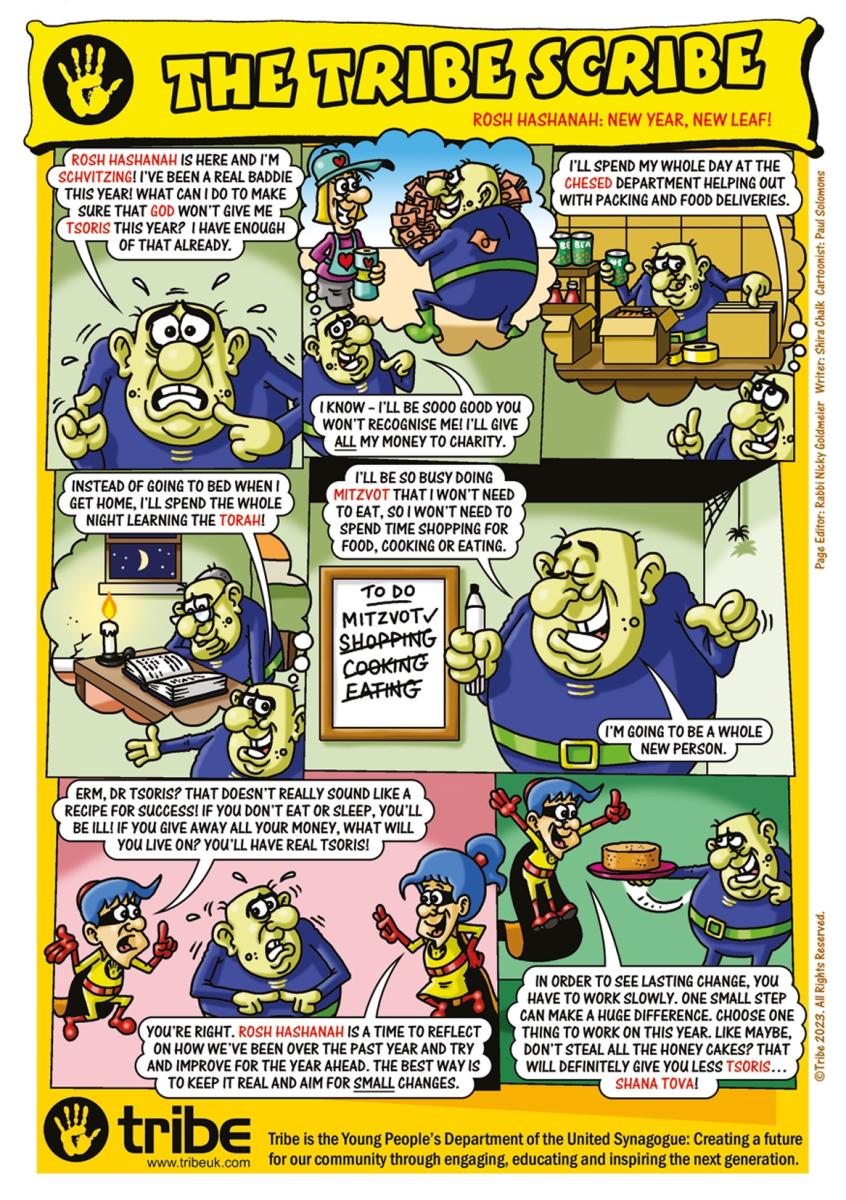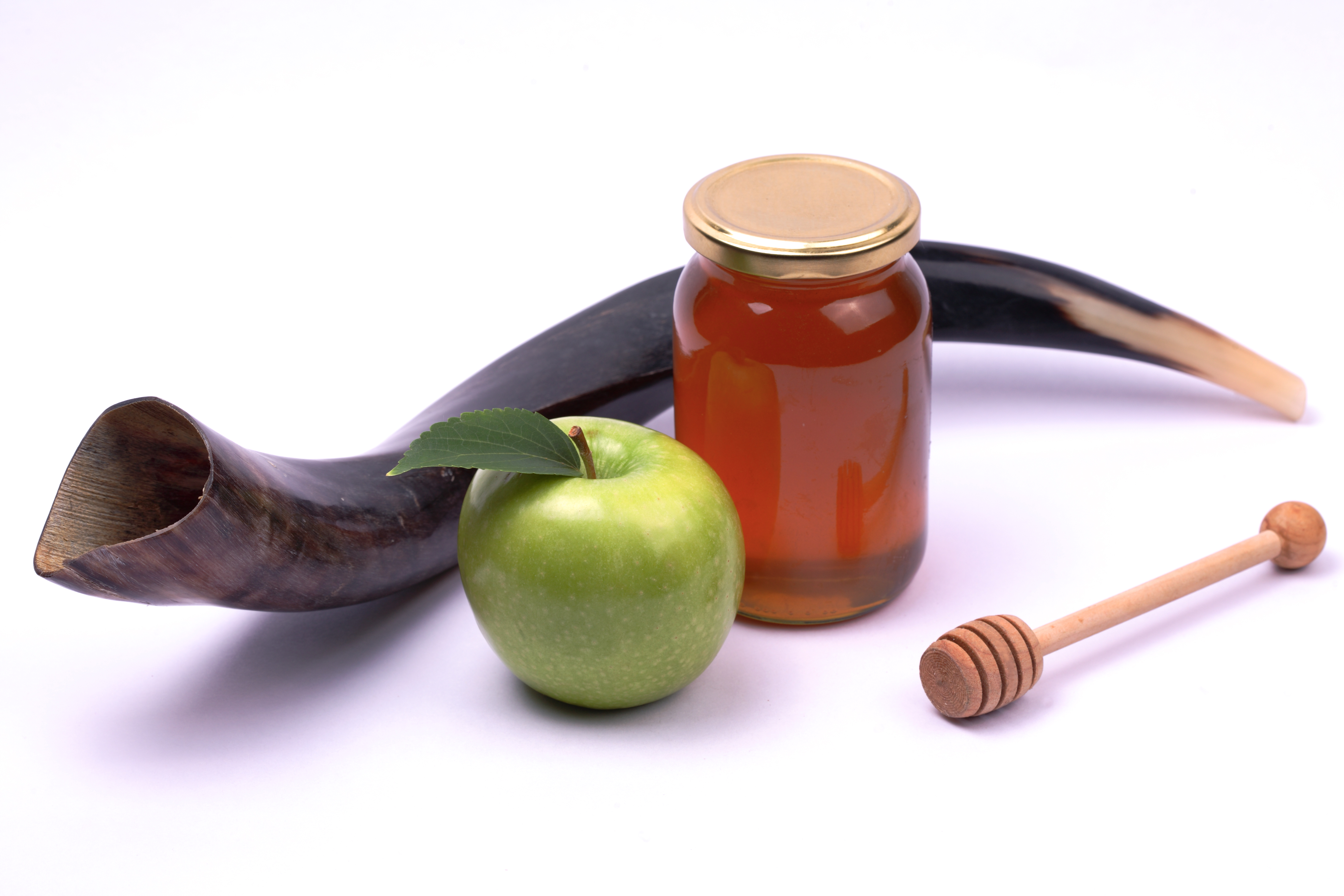Bonjour / Hello [nickname_else_first_name],
Table of contents
1) Perashat Hashavoua - Rabbi Eli Mansour
2) Halakhat Hashavoua (Halakhot related to day to day life) - Hazzan David Azerad
- laws of Rosh Hashana
3) Holy Jokes!
4) FOR KIDS!
Rosh HaShanah (Hebrew: רֹאשׁ הַשָּׁנָה, Rōʾš hašŠānā, literally "head of the year") is the Jewish New Year. The biblical name for this holiday is Yom Teruah (יוֹם תְּרוּעָה, Yōm Tərūʿā, lit. "day of shouting/blasting"). It is the first of the Jewish High Holy Days (יָמִים נוֹרָאִים, Yāmīm Nōrāʾīm, "Days of Awe"), as specified by Leviticus 23:23–25,[1] that occur in the late summer/early autumn of the Northern Hemisphere. Rosh Hashanah begins a ten-day period of penitence culminating in Yom Kippur, as well as beginning the cycle of autumnal religious festivals running through Sukkot and ending in Shemini Atzeret.
Rosh Hashanah is a two-day observance and celebration that begins on the first day of Tishrei, which is the seventh month of the ecclesiastical year. In contrast to the ecclesiastical lunar new year on the first day of the first month Nisan, the spring Passover month which marks Israel's exodus from Egypt, Rosh Hashanah marks the beginning of the civil year, according to the teachings of Judaism, and is the traditional anniversary of the creation of Adam and Eve, the first man and woman according to the Hebrew Bible, as well as the initiation of humanity's role in God's world.
Rosh Hashanah customs include sounding the shofar (a hollowed-out ram's horn), as prescribed in the Torah, following the prescription of the Hebrew Bible to "raise a noise" on Yom Teruah. Its rabbinical customs include attending synagogue services and reciting special liturgy about teshuva, as well as enjoying festive meals. Eating symbolic foods, such as apples dipped in honey, hoping to evoke a sweet new year, is an ancient tradition recorded in the Talmud.[2]
-Wikipedia
The Fast of Gedalia (/ˌɡɛdəˈlaɪ.ə, ɡəˈdɑːliə/; Hebrew: צוֹם גְּדַלְיָה Tzom Gedalya), also transliterated from the Hebrew language as Gedaliah or Gedalya(h), is a minor Jewish fast day from dawn until dusk to lament the assassination of Gedaliah, the righteous governor of what was the Kingdom of Judah. His death ended Jewish autonomy following the destruction of the First Temple and the fall of King Zedekiah.[1]
-WIkipedia

This Week's Parasha Insight with Rabbi Eli Mansour
Rosh Hashana- Our Annual Resurrection
Rav Naftali Trop (1871-1928), one of the most illustrious disciples of the Hafetz Haim, once observed a common mistake that many people make as they go into Rosh Hashanah. Many people enter Rosh Hashanah with the mindset that they rightfully deserve everything in their lives – their families, their health, their homes, their bank accounts, and all their other assets – and G-d needs a reason to take it away from them. Rav Trop compared this mindset to the situation of two litigants coming to court. The defendant is the "Muhzak" – the presumed owner of the property or money in question, and the burden of proof rests upon the plaintiff to show that the plaintiff owes him something. Similarly, people see themselves as the "Muhzak," as the presumed rightful owners of everything they have, and some "proof" needs to be brought that there is something they have which they do not deserve and should be taken away from them.
But this mindset, Rav Trop explained, is incorrect. As we recite in our Selihot prayers, "Ke’dalim U’ch’rashim Dafaknu Delatecha" – "We have knocked on Your doors like paupers and mendicants." When we begin Rosh Hashanah, we have nothing. We have no assets. We do not even have our very life.
Each Rosh Hashanah, if we earn a favorable outcome, we are given a one-year lease on everything, including our very lives. That lease expires as Rosh Hashanah begins each year. And so when we begin Rosh Hashanah, we are, in a sense, dead. We do not even have our lives. We need to earn everything anew.
This explains a remarkable Halacha in the Shulhan Aruch (Orah Haim 225). The Shulhan Aruch writes that when a person sees a close friend or family member for the first time in thirty days, he recites the Beracha of "She’hehiyanu" to express his joy over the reunion. But if he has not seen the close friend or family member for the first time in a year, then he recites the Beracha of "Mehayeh Ha’metim," thanking Hashem for "resurrecting the dead." (We do not discuss here the question of whether or not this requirement applies nowadays, when, even if two friends or family members do not see each other for an extended period, they are, in most cases, in contact.) The Mishna Berura cites those who explain that this Beracha is recited because the two friends or family members had not seen each other since Rosh Hashanah, and thus they did not know whether or not they earned the right to continue living. When we go into Rosh Hashanah, we are "dead," in that we no longer have a right to anything, including our lives. And thus when we see somebody after Rosh Hashanah, we can recite "Mehayeh Ha’metim" – because that person has been "resurrected."
This understanding of life should not cause us anxiety or depression. To the contrary, it should invigorate us. If we recognize that each day is a precious blessing from Hashem, then we will take full advantage of it. If we understand that nothing is guaranteed, not even our right to life, then we will cherish every moment and utilize it properly.
This is the purpose of our "annual resurrection" on Rosh Hashanah. When we reinforce our awareness that life is a gift granted to us by Hashem in His boundless grace and compassion, then we will commit ourselves to use our lives the way they are meant to be used – productively, meaningfully, and for the purpose of serving our Creator. We must enter this day with a keen awareness that everything we have is a great blessing which we need to earn – and which, once we have earned it, must be used the right way and for the right purpose.

The laws of Rosh Hashanah, according to the rulings of Maran Rabbi Obadiah Yosef ZT”L
In what order should one proceed with the Simanim on Rosh Hashanah night?
Our sages instituted for us to eat on the 2 nights of Rosh Hashanah various kinds of foods as a good sign for the whole year (The Simanim). There is no need to follow the order written in the siddurim.The main thing is that we make the first blessing on the dates, which are part of the seven kinds of fruits that Eretz Yisrael was blessed with.Following the dates one can eat all of the other sweet fruits or vegetables that are in front of him (all of the other Simanim).
The proper Seder (order) of the night is first recite the Kiddush, taste from the wine ,Netilat Yadayim(the ritual of washing your hands) then Hamotzi eat from the bread Kezayit (minimum 29gram) and only then begin with the Simanim.If one starts eating the Simanim after Kiddush before the Hamotzi he is entering a Safek (a doubt)if he should recite or not Bracha Achrona(Al Hamichya) or not.Therefore in order to avoid all doubt the best thing is to follow the latter suggestion Kiddush, Netilah ,Hamotzi then proceed with the Seder of the Simanim.
As for the first blessing one should not start with (Karti)Leek or (Silka)swiss chard or( Kera)long squash/ pumpkin or (Rubia)black eyed peas/beans/sesame nor the head of a lamb since these are things that we can eat during our meal as opposed to dates pomegranates and apples they are considered as dessert.
There are those who have the custum to start the 1st night with the Tamar ( the dates) and the 2nd night with the apple.
One should leave a new fruit for the 2nd night so that they have something to say Shehecheyanu on ,preferably the pomegranate is left for the second night.
What do we recite first , the Beracha for the Siman or the Yehi Ratzon for the Siman ?
One will begin first with the blessing of the fruit or another Siman and taste a bit of it,then proceed with the text of the Yehi Ratzon and then continue to eat the fruit or the Siman.There are different minhagim for the Seder in different households.Some will have all of those who are gathered around the table hold the Siman(fruit or Vegetable etc..) in their hands, and one person designated leading the Seder of the Berachot (Ba’al Habayit or someone else..)) recites the Beracha and has the Kavana (the intention to exempt everyone).All sitting around the table will answer amen and taste from the Siman.The person leading will continue by reciting the Yehi Ratzon aloud for everyone to hear and everyone answering amen. Others have the Minhag to recite all together the Berachot and the Yehi Ratzon.
Bevirkat Shabbat Shalom
Shana Tova Umetuka
David Azerad
3) HOLY JoKeS!!
Selection of funny snippets, loosely related to this weeks parashah or current events, to brighten your day



4) FOR KIDS
Click on the image to open the youtube video



















